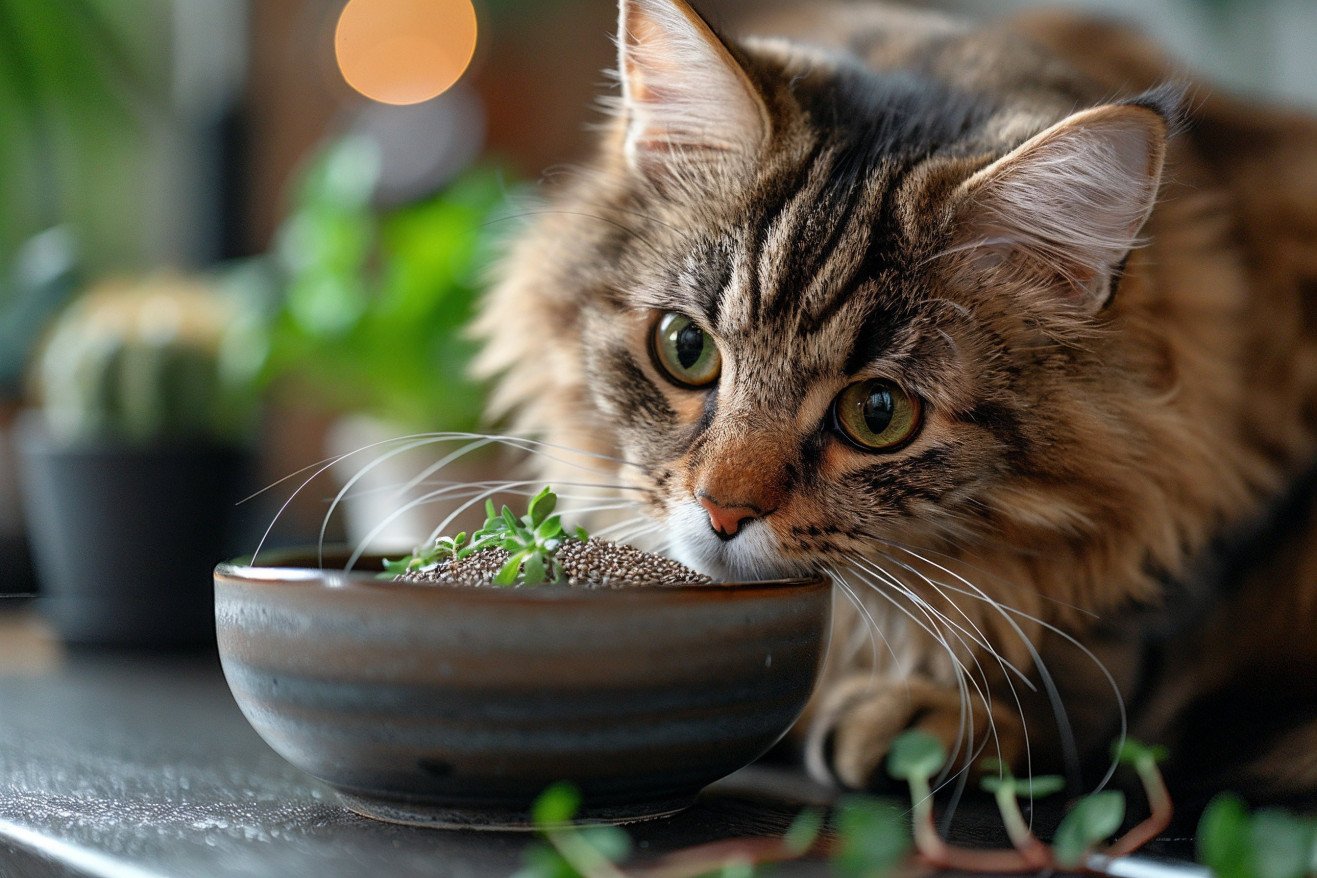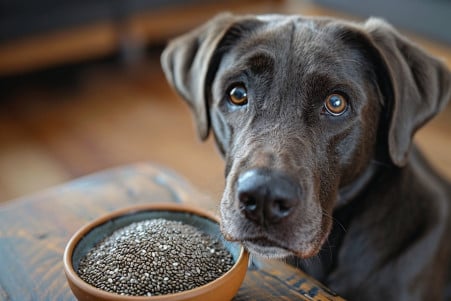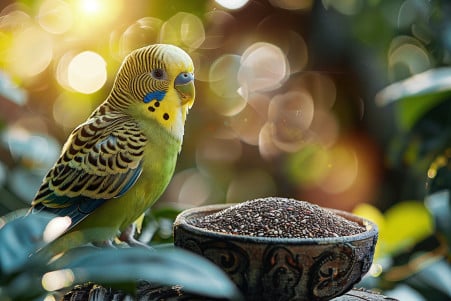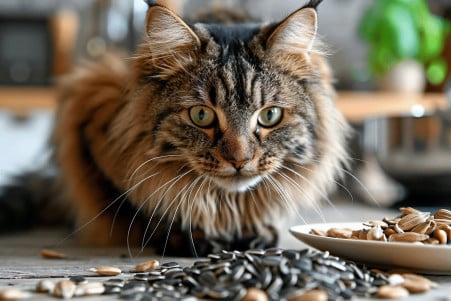Can Cats Eat Chia Seeds? A Vet Weighs In On Feline Nutrition
1 May 2024 • Updated 30 April 2024

If you’re thinking about giving your cat chia seeds as a healthy treat or supplement, you may be wondering if they’re safe and what kind of benefits they offer. While chia seeds are safe for cats and can provide fiber, antioxidants, and omega-3 fatty acids, they should be a small part of your cat’s diet because too many chia seeds can lead to digestive upset.
In the sections below, we’ll delve into the most recent veterinary science and expert opinions on the subject, including research on how chia seeds impact cats’ health and the right amount of chia seeds to give your cat based on their size and diet. By the end, you’ll know whether you should add chia seeds to your cat’s diet and, if so, how to do it in a way that ensures they get the most nutritional value.
Can cats eat chia seeds?
Nutritional Benefits of Chia Seeds for Cats
Chia seeds have a variety of nutritional properties that can help improve your cat's health. One of the biggest benefits of chia seeds is their high levels of omega-3 fatty acids, especially alpha-linolenic acid (ALA). Omega-3s are known to help with heart health, digestion, and inflammation, which can even help lower the risk of bone fractures, according to Catit.
Chia seeds are also high in fiber, which can help with digestion and hairball control. As PMC explains, the soluble fiber in chia seeds can create a gel that can help regulate transit time and fermentation in the gut.
In addition, chia seeds are full of antioxidants, vitamins, and minerals that can help ensure your cat is getting a well-rounded diet. The antioxidants and anti-inflammatory properties in chia seeds can help reduce oxidative stress and inflammation, which can help improve overall health.
In terms of what this means for your cat, chia seeds can help improve skin and coat health because of their protein and omega-3 fatty acid content. Meanwhile, the omega-3s and antioxidants in chia seeds can also help improve cognitive function and joint health, although more research is needed to confirm these benefits. Overall, chia seeds are a nutrient-rich food that can help improve your cat's health in a variety of ways when added to a balanced diet.
How Much Chia Seed Can Cats Have?
The amount of chia seeds you can give your cat will depend on their weight and diet. According to PetFirst, a good rule of thumb is to give your cat 1/4 to 1/2 teaspoon of soaked chia seeds for every 5 pounds they weigh. You should always introduce chia seeds to your cat slowly, starting with a small amount and watching for any signs of digestive upset.
To avoid any potential blockages or digestive issues, The Lady Bug advises soaking or grinding the chia seeds before giving them to your cat. You should also mix the chia seeds into your cat's wet food or treats rather than giving them to your cat directly or mixing them into dry food. This is because, as Hepper points out, dry chia seeds can absorb excess water and expand in your cat's digestive tract, which could lead to a blockage.
If you follow these recommendations and properly prepare the chia seeds, you can safely add this nutritious superfood to your cat's diet. That said, it's important to understand the potential dangers and downsides of giving chia seeds to your cat.
Risks and Side Effects of Giving Chia Seeds to Cats
According to Catster, overeating chia seeds can cause digestive problems in cats, including constipation, diarrhea, and intestinal blockages. Chia seeds can also be a choking hazard for cats, especially if they are served dry or in large quantities.
Cats with certain health issues, including diabetes and kidney disease, may need to avoid chia seeds or speak with a vet before eating them, according to Animal Gator. This is because chia seeds are high in fiber, which can lead to digestive issues and interfere with medications. While allergies to chia seeds are uncommon, they can happen and may require you to stop giving them to your cat, says Catster.
Because of these risks, it’s important to introduce chia seeds slowly, watch for any negative side effects, and talk to your vet, especially if your cat has any health issues. As with anything, it’s important to use chia seeds in moderation when feeding them to your cat.
Chia Seed Oil
Chia seed oil is a plant-based source of omega-3 fatty acids, especially alpha-linolenic acid (ALA). According to Superior Feline, chia seeds have the highest plant-based source of omega-3s, with 75% of the fats being ALA. This means that chia seed oil is a good option for cats that are allergic or sensitive to fish-based omega-3 supplements.
In addition to omega-3s, The Pet Health and Nutrition Center explains that chia seed oil is full of antioxidants and has a better omega-3 to omega-6 fatty acid ratio than other plant oils. This may have several potential benefits for cats, including supporting cognitive function, joint health, and heart health.
On the other hand, as Superior Feline explains, the biggest downside to chia oil is that, as a plant-based omega-3, it doesn’t contain meaningful amounts of the omega-3s EPA and DHA, which are only found in marine sources. More studies are needed to determine the safety and effectiveness of using chia seed oil to supplement cats’ diets with omega-3s.
Conclusion: How to Add Chia Seeds to Your Cat's Diet
Chia seeds can be a helpful addition to a cat's diet in moderation, as they offer omega-3s, fiber, and antioxidants. However, because cats are obligate carnivores, they should not be a major part of a cat's diet. It's important to work with a veterinarian and stick to the recommended doses to avoid potential digestive problems and other issues.
Chia seed oil can be a good option for cats that are allergic to fish-based omega-3 supplements. In general, chia seeds and chia seed oil can be safe and even helpful for cats when they are added to a diet in a way that meets their specific nutritional needs.


